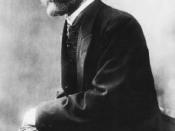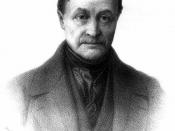AbstractComte is known as the "founder" of sociology. He is remembered to this day in sociology for his championing of positivism, wherein his idea is based on the premise that everything in society is observable and subject to patterns or laws. His work has been a fundamental source for subsequent sociologists as a basis for their own sociological theory. This essay expresses Comte's thought on the nature of phenomena, and how society, and the individual, gradually transition from a world controlled by the supernatural to a scientific world that can be observed and explained concretely. The scope of his methodology is broad, but the ensuing impact it has had on the field of sociological theory cannot be understated. Positive Sociologists since Comte have, in a sense, taken up the torch in pursuit of understanding specialized phenomena. His simple, yet heavy theories are the genesis for almost all sociological thought since the foundation of the field.
Auguste Comte (1798-1857) was a French philosopher who is credited with the invention of the field of sociology and sociological positivism. Comte's primary intent in his studies was largely devoted to finding the general laws of society and the mechanisms within it. He did not coin the word "sociology" until 1839, before that he referred to his social science as a "social physics" located within the field of "social physiology". Nevertheless he claimed to have discovered the basic law of this domain in 1822, a law he baptized as the "law of the three states" within his positivism sociology (Gane, 2006). These laws demonstrate how society, and indeed individuals as well, transitioned into a modern era from a previously pre-modern one (of knowledge), and he claimed that it provided the fundamental discovery of the body and the logic of a new science, thus modern sociology.


